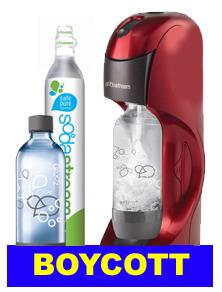Lyndi Borne is a media intern at the Institute for Policy Studies.
Among many of the usual suspects airing ads during the Super Bowl, one small company shook up some conversation with an ad that was banned by CBS. The company, SodaStream, acts like it’s doing the world a favor by selling home carbonation machines, and its ads jab at Coca-Cola and Pepsi for wasting bottles. They originally wanted to air a commercial during America’s most-watched television event that explicitly attacked the two largest makers of sugary cola, but were bullied into airing a softer version of the ad imploring viewers to buy their product and “free the bubbles.” As controversy on CBS’s ban bubbled over, marketers everywhere had their say. A website devoted to Super Bowl ads actually wrote an article about them entitled “SodaStream: A David and Goliath Story?” Marketers are buying the story that SodaStream is a do-gooder because their customers buy fewer bottles.
 But SodaStream is no do-gooder. Their headquarters and manufacturing facilities, located in an Israeli settlement in the center of the West Bank, are built upon the blood and tears of the Palestinian people. I’ve seen the devastation of these settlements, and when I saw the SodaStream commercial on Sunday night, I went flat.
But SodaStream is no do-gooder. Their headquarters and manufacturing facilities, located in an Israeli settlement in the center of the West Bank, are built upon the blood and tears of the Palestinian people. I’ve seen the devastation of these settlements, and when I saw the SodaStream commercial on Sunday night, I went flat.
SodaStream is part and parcel of the continued illegal Israeli occupation of Palestine. If we’re talking David and Goliath, SodaStream is more aptly viewed on the Goliath side of the metaphor. In reality, it is a profit-making enterprise built on land illegally seized by Israel, with the help of a military that is an industrial, high-tech monster that seeks to slowly strangle the Palestinian people to death.
What most people don’t understand about the settlements is that they not only push people off of the land, but they then also take regional resources for themselves. Water, for example, is often stolen from people whose ancestors long ago learned to adapt to the desert. The Israeli goal, it seems, is to make Palestinian life so unbearable that people leave, or die.
I’ve witnessed the destructive force of settlements. From the first time I set foot on a West Bank settlement in 2000 to the last time I was there in 2010, the effect and the number of settlements had noticeably increased. In the Palestinian West Bank, I saw more checkpoints, longer lines in traffic, more roadblocks, and diversions to make way for Jewish-only settler roads. Even water pressure lowered as the settlements demanded more water diverted to them. And — at least in Hebron — more settlers were throwing rocks at Palestinian women, men, and children.
SodaStream has been singled out by Jewish Voice for Peace and others for its explicit, egregious involvement in settlement activity. Israeli settlement policy is opposed by many Israeli citizens and the United States, and is now deemed unlawful by a United Nations panel.
SodaStream is headquartered on Ma’aleh Adumim, the third largest settlement in the West Bank, built on land that belonged to the Palestinian towns of Abu Dis, Azarya, Atur, Issauya, Han El Akhmar, Anata, and Nebi Mussa up into the 1970s. Israel continues to expand and solidify such settlements around Jerusalem until Palestinians cannot any more access the city.
As with most Israeli public relations campaigns, SodaStream is clever at attaching itself to so-called “liberal” values of environmentalism, peace, justice, and freedom. However, as with most Israeli PR campaigns, the truth of human rights violations will eventually come out.
So, no matter how you feel about their commercials, don’t buy SodaStream. The faster we as consumers can send a message to companies complicit in the Israeli occupation, the faster Palestinians can achieve freedom.
“Free the bubbles?” How about, stop operating on stolen Palestinian land, and “free Palestine.”